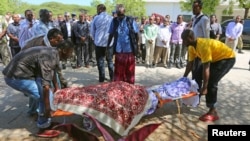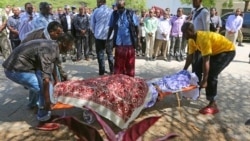Each year, the U.S. State Department sends Congress reports prepared by our diplomats assessing respect for human rights around the world. They evaluate how governments show respect for human dignity and individual freedoms, and they help shape our nation’s foreign policies. The reports also signal to human rights defenders and activists under siege that we recognize their struggle and stand with them.
For far too many people, 2014 was defined by suffering and abuse perpetrated by terrorist groups like ISIL, Boko Haram and al-Shabaab that exploit religious discourse and divisions to advance their destructive ideologies. Meanwhile, governments in China, Egypt, Eritrea, Iran, Russia, Saudi Arabia and elsewhere continued to stifle a free press and the development of civil society by jailing journalists, bloggers and others.
As in the previous years, the state of human rights in Somalia remains a particular U.S. concern. Civilians there continued to suffer from conflict-related abuses, including killings and the diversion or confiscation of humanitarian assistance by armed groups, primarily al-Shabaab. According to the U.N., 1,133,000 Somalis have been displaced internally and more than a million others have fled to other nations.
Clan militias and al-Shabaab continued to commit grave abuses throughout the country, including extrajudicial killings, disappearances, cruel and unusual punishment, rape, restrictions on civil liberties and freedom of movement, and conscription and use of child soldiers. Some African Union peacekeeping troops also were found to have committed sexual abuse and exploitation, including rape.
Violence and discrimination against women and girls, including rape and female genital mutilation or cutting, was widespread. Other major abuses included harsh and life-threatening prison conditions; arbitrary and politically motivated arrest and detention; trafficking in persons; abuse of and discrimination against minority clans; restrictions on workers’ rights; forced labor and child labor.
There is no self-importance or arrogance in preparing this and other reports. We in the United States have seen our own share of racial discord and unrest recently, so we approach this with great self-awareness. But we also understand that with regard for human rights, every country, including our own, has room to improve.
We’re committed to advancing universal rights, building partnerships that will move us forward, helping every man, woman and child live up to their potential. And in cases like Somalia, we are also committed to speaking out for those unable to do so for themselves.

















